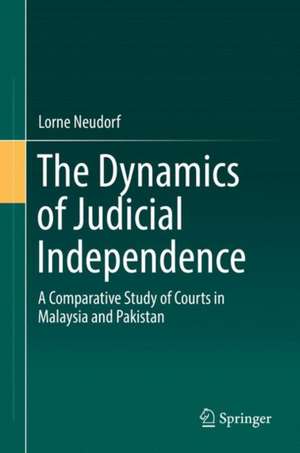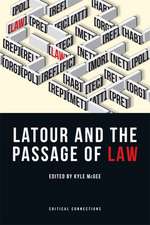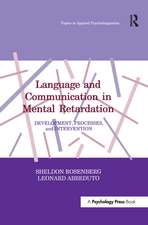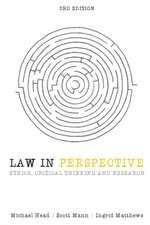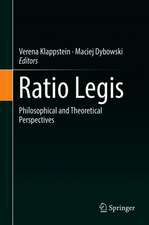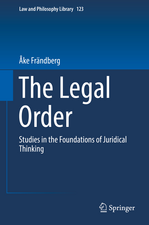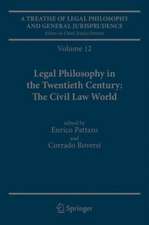The Dynamics of Judicial Independence: A Comparative Study of Courts in Malaysia and Pakistan
Autor Lorne Neudorfen Limba Engleză Hardback – mar 2017
| Toate formatele și edițiile | Preț | Express |
|---|---|---|
| Paperback (1) | 582.63 lei 6-8 săpt. | |
| Springer International Publishing – 13 iul 2018 | 582.63 lei 6-8 săpt. | |
| Hardback (1) | 785.86 lei 6-8 săpt. | |
| Springer International Publishing – mar 2017 | 785.86 lei 6-8 săpt. |
Preț: 785.86 lei
Preț vechi: 958.37 lei
-18% Nou
Puncte Express: 1179
Preț estimativ în valută:
150.37€ • 157.00$ • 124.45£
150.37€ • 157.00$ • 124.45£
Carte tipărită la comandă
Livrare economică 04-18 aprilie
Preluare comenzi: 021 569.72.76
Specificații
ISBN-13: 9783319498836
ISBN-10: 3319498835
Pagini: 251
Ilustrații: XIV, 251 p.
Dimensiuni: 155 x 235 x 16 mm
Greutate: 0.55 kg
Ediția:1st ed. 2017
Editura: Springer International Publishing
Colecția Springer
Locul publicării:Cham, Switzerland
ISBN-10: 3319498835
Pagini: 251
Ilustrații: XIV, 251 p.
Dimensiuni: 155 x 235 x 16 mm
Greutate: 0.55 kg
Ediția:1st ed. 2017
Editura: Springer International Publishing
Colecția Springer
Locul publicării:Cham, Switzerland
Cuprins
1. The Problem of Judicial Independence.- 2. Judicial Independence in Malaysia.- 3. Judicial Independence in Pakistan.- 4. Conclusion.
Textul de pe ultima copertă
This book examines the legal principle of judicial independence in comparative perspective with the goal of advancing a better understanding of the idea of an independent judiciary more generally. From an initial survey of judicial systems in different countries, it is clear that the understanding and practice of judicial independence take a variety of forms. Scholarly literature likewise provides a range of views on what judicial independence means, with scholars often advocating a preferred conception of a model court for achieving ‘true judicial independence’ as part of a rule of law system. This book seeks to reorient the prevailing approach to the study of judicial independence by better understanding how judicial independence operates within domestic legal systems in its institutional and legal dimensions. It asks how and why different conceptualisations of judicial independence emerge over time by comparing detailed case studies of courts in two legally pluralistic states, which share inheritances of British rule and the common law. By tracing the development of judicial independence in the legal systems of Malaysia and Pakistan from the time of independence to the present, the book offers an insightful comparison of how judicial independence took shape and developed in these countries over time. From this comparison, it suggests a number of contextual factors that can be seen to play a role in the evolution of judicial independence. The study draws upon the significant divergence observed in the case studies to propose a refined understanding of the idea of an independent judiciary, termed the ‘pragmatic and context-sensitive theory’, which may be seen in contradistinction to a universal approach. While judicial independence responds to the core need of judges to be perceived as an impartial third party by constructing formal and informal constraints on the judge and relationships between judges and others, its meaning ina legal system is inevitably shaped by the judicial role along with other features at the domestic level. The book concludes that the adaptive and pragmatic qualities of judicial independence supply it with relevance and legitimacy within a domestic legal system.
Caracteristici
Offers detailed case studies and information on judicial independence First comparative study of judicial independence in Malaysia and Pakistan Presents a fresh conceptual analysis of judicial independence, backed up by case studies Includes supplementary material: sn.pub/extras
